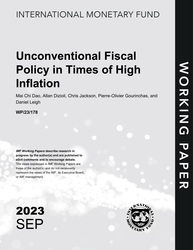
Unconventional Fiscal Policy in Times of High Inflation
Unconventional Fiscal Policy in Times of High Inflation
READ MORE...
Volume/Issue:
Volume 2023
Issue 178
Publication date: September 2023
ISBN: 9798400251399
$20.00
Add to Cart by clicking price of the language and format you'd like to purchase
Available Languages and Formats
| English |
Prices in red indicate formats that are not yet available but are forthcoming.
Topics covered in this book
This title contains information about the following subjects.
Click on a subject if you would like to see other titles with the same subjects.
Inflation , Labor , Economics- Macroeconomics , Money and Monetary Policy , Public Finance , Economics / General , Inflation , fiscal policy , monetary policy , , headline-inflation shock , inflation path , longer-term inflation expectation , inflation dynamics , counterfactual headline inflation , Energy prices , Labor markets , Inflation targeting , Global
Summary
The surge in energy prices in 2022 has been a defining factor behind the increase in euro area inflation. We assess the impact of “unconventional fiscal policy,” defined as the set of fiscal measures, possibly expansionary, motivated by a desire to mute the effects of the increase in energy prices and to lower inflation. Overall, we find that these unconventional measures reduced euro area inflation by 1 to 2 percentage points in 2022 and may avoid an undershoot later on. When nonlinearities in the Phillips curve are taken into account, the net effect is to reduce inflation by about 0.5 percentage points in 2021-24, and keep it nearer to its target. About one-third to one-half of the reduction in 2022 reflects the direct effects of the measures on headline inflation, with much of the remainder reflecting the lower pass-through to core inflation. The fiscal measures were deficit-financed but had limited effects on raising inflation by stimulating demand and instead modestly helped to stabilize longer-term inflation expectations. Looking ahead, the prospective decline in inflation in the euro area is partly due to fortunate circumstances, with energy prices falling from their 2022 peaks and their pass-through effects fading, and with less economic overheating than in economies such as the United States. Implementing similar measures in the face of a more persistent increase in energy prices, or in a more overheated economy, would have caused a more persistent rise in core inflation.
Copyright © 2010 - 2026
Powered by:
AIDC



